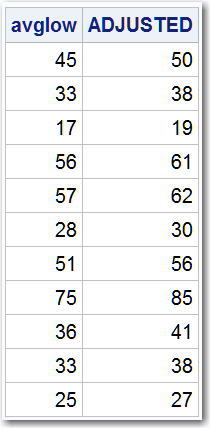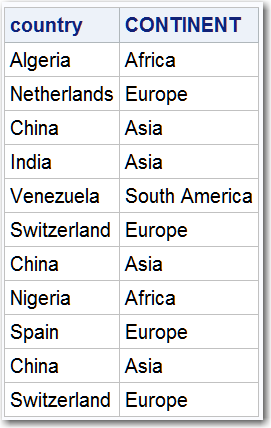CASE Expression
Selects result values that satisfy search conditions and value comparisons.
Syntax
CASE [case-expression]
WHEN when-expression THEN result-expression
...
[WHEN when-expression THEN result-expression]
[ELSE result-expression]
END
Arguments
case-expression
specifies any valid SQL expression that evaluates to a table column whose values are compared to when-expression.
| See | <sql-expression> |
| FedSQL Expressions |
when-expression
result-expression
specifies an SQL expression that evaluates to a value.
| See | <sql-expression> |
Details
The CASE expression
selects values if certain conditions are met. The case-expression argument
returns a single value that is conditionally evaluated for each row
of a table. Use the WHEN-THEN clauses to execute a CASE expression
for some, but not all of the rows in the table that is being queried
or created. The optional ELSE expression gives an alternative action
if no THEN expression is executed.
When you omit case-expression, when-expression is
evaluated as a Boolean (true or false) value. If when-expression returns
a nonzero, non-null result, then the WHEN clause is true. If case-expression is
specified, then it is compared with when-expression for
equality. If case-expression equals when-expression,
then the WHEN clause is true.
If the when-expression is
true for the row that is being executed, then the result-expression that
follows THEN is executed. If when-expression is
false, then FedSQL evaluates the next when-expression until
they are all evaluated. If every when-expression is
false, then FedSQL executes the ELSE expression, and its result becomes
the CASE expression's result. If no ELSE expression is present
and every when-expression is
false, then the result of the CASE expression is null.
Comparisons
Examples
Example 1: The CASE Expression Using A Search Condition
Table: WORLDTEMPS
Example 2: The CASE Expression Using a Value
Table: WORLDTEMPS
select Country,
case Country
when 'Algeria' then 'Africa'
when 'Nigeria' then 'Africa'
when 'Netherlands' then 'Europe'
when 'Spain' then 'Europe'
when 'Switzerland' then 'Europe'
when 'China' then 'Asia'
when 'India' then 'Asia'
when 'Venezuela' then 'South America'
else 'Unknown'
end
as Continent from worldtemps;See Also
<search-condition>
in the SELECT Statement
Copyright © SAS Institute Inc. All rights reserved.

